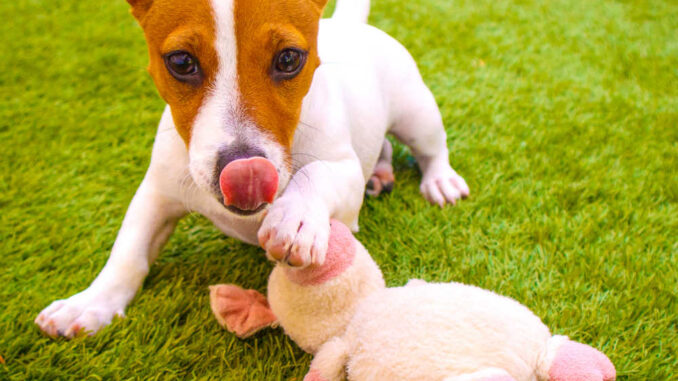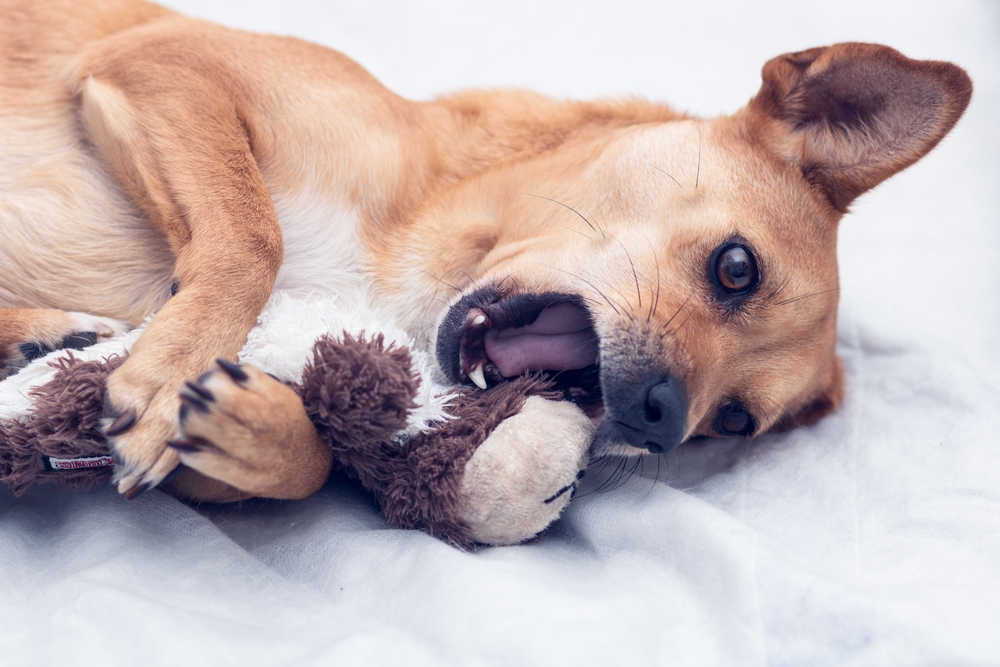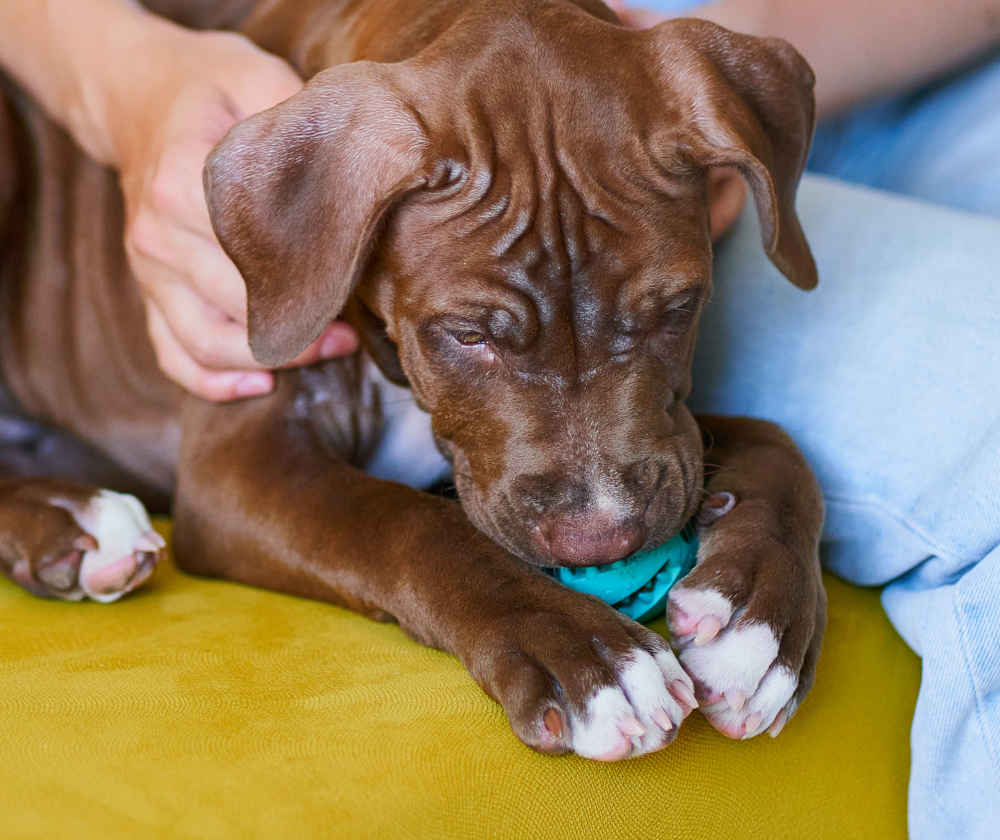Dogs can be fascinating creatures, and their behavior never ceases to amaze us. One common behavior that many dog owners have noticed is their dogs licking their toys. It may seem like a simple act of enjoyment, but there can be more to it than meets the eye. In this article, we will delve into the reasons behind this behavior and when it may become a cause for concern.
Dogs and Their Toys: A Unique Bond
Dogs have a special relationship with their toys. Just like how we rely on our hands for our daily activities, dogs use their mouths to explore the world and keep themselves occupied. So it’s natural for dogs to lick their toys as a way of engaging with them and having fun. This behavior is especially common among puppies and teething dogs, as they use their mouths to learn about their surroundings.
The Taste of Fun
Sometimes, dogs may lick their toys simply because they taste good. If a toy smells or tastes like food, your dog will naturally want to lick it. Toys that are filled with peanut butter or kept near doggy treats are particularly tempting for them. Additionally, if it’s close to mealtime or your dog is feeling thirsty, they might lick their toys to communicate their hunger or thirst.
The Germ Factor
While dogs have saliva that contains antimicrobial and antibacterial properties, it’s important to note that their toys can harbor harmful organisms. Pet toys, including those beloved by your canine companion, can be some of the germiest objects in our homes. Studies have found harmful organisms like Staph, yeast, and mold on pet toys. Therefore, it’s crucial to wash both hard and soft dog toys at least once a month to keep your dog safe and healthy.
When Licking Becomes Excessive: Possible Causes
Excessive licking of toys can be a sign of various underlying issues. If you notice that your dog is excessively licking their toys, it’s essential to consider these possible causes:
1. Boredom
If your dog is slobbering all over their toys, it could be a sign of boredom. Dogs, regardless of size, age, or breed, need mental and physical stimulation. Providing quality attention, playtime, and exercise can help alleviate this type of excessive licking.
2. Pica
Excessive licking of toys can also be a symptom of a dangerous behavioral urge called pica. If your dog routinely consumes non-food items like fabric, dirt, or rocks, they may have this disorder. It’s best to consult with a veterinary behaviorist to address this issue.
3. Nausea
Dogs can experience nausea for various reasons, including a change in diet, motion sickness, or ingesting something they shouldn’t have. If your dog is feeling queasy, they might lick their toys to self-soothe or get rid of a bad taste in their mouth.
4. Anxiety
Anxiety can cause dogs to engage in repetitive behaviors, such as excessive licking of toys. Licking can provide a soothing sensation for dogs experiencing anxious feelings. If your dog exhibits signs of anxiety, it’s important to address this issue to provide them with the necessary support.
5. Dental Disease
Excessive licking, bad breath, drooling, and difficulty chewing food could indicate dental problems such as inflamed gums or gingivitis. If you notice any of these symptoms, it’s advisable to bring your dog to a veterinarian for a dental check-up.
6. Canine Compulsive Disorder
Some dogs may develop canine compulsive disorder (CCD), a condition characterized by repetitive and compulsive behaviors. Excessive licking of toys can be a manifestation of CCD, especially in certain breeds predisposed to this condition. Consultation with a veterinary behaviorist can help diagnose and manage CCD.
7. Dementia
Older dogs, like older humans, can develop dementia or cognitive dysfunction syndrome (CDS). Dogs with CDS may engage in strange behaviors, including excessive licking of toys. If you suspect your dog has dementia, it’s important to seek guidance from your vet for proper care and management.
8. Neurological Issues
Neurological conditions can also lead to excessive licking in dogs. If your dog displays other neurological symptoms, such as abnormal movements or gait, it’s crucial to consult with a veterinarian for a thorough evaluation.
Identifying When to Seek Veterinary Assistance
If your dog’s behavior is unusual or concerning, it’s best to consult with your vet. Certain signs indicate the need for veterinary attention, including dropping food while eating, increased drooling, changes in appetite, loss of interest in play, inappropriate urination or defecation, and licking toys during stressful events. It’s always better to err on the side of caution and seek professional advice when in doubt.
Encouraging Alternate Activities
While licking toys can be perfectly normal behavior for dogs, excessive licking may need redirection. Offering your dog alternative stimulating activities can help divert their attention. Training exercises, scent work activities, and interactive puzzles can engage your dog mentally and provide them with a healthier outlet for their energy.
Frequently Asked Questions
Why does my dog lick his toy after he plays?
Chances are that your dog has a positive association with both the toy and the sensation of licking. Licking their toys after playtime is likely a way for them to wind down and relax.
Is it okay if my dog is obsessed with one toy?
“It’s fine if a dog has a particular toy that they really enjoy,” says Pawsoha’s Certified Dog Behaviorist Mindy Waite, Ph.D. In fact, a favorite toy can be useful for training activities. However, it’s a good idea to have multiple toys available for your dog to enjoy in case their favorite toy breaks or gets lost.
My dog brings its toys everywhere. Is that normal?
If your dog loves to carry their toys everywhere, it’s a sign that they feel safe, secure, and relaxed when they have their toys with them. This behavior is perfectly normal and doesn’t require discouragement.
Conclusion
Understanding why dogs lick their toys can help us better care for our furry friends. While it’s generally a normal behavior, excessive licking can signal underlying issues, such as boredom, anxiety, or medical conditions. By observing your dog’s behavior and seeking veterinary advice when necessary, you can ensure their overall well-being. Remember to provide a variety of stimulating activities for your dog to engage in and enjoy their precious playtime. Visit Pawsoha to explore a range of high-quality toys and products designed to bring joy to your canine companion.


